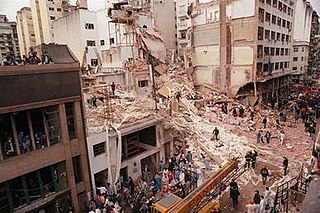
The attack on the Israeli embassy in Buenos Aires was a suicide bombing attack on the building of the Israeli embassy of Argentina, located in Buenos Aires, which was carried out on 17 March 1992. 29 civilians were killed in the attack and 242 additional civilians were injured.

Republican Proposal, usually referred to by its abbreviation PRO, is a political party in Argentina. PRO was formed as an electoral alliance in 2005, but was transformed into a national party in 2010. It is the major component of the Juntos por el Cambio coalition, and its leader is former Argentine president Mauricio Macri, who is the party's president since May 2024.

Germany–Israel relations are the diplomatic relationship between the Federal Republic of Germany and the State of Israel. After the end of World War II and the Holocaust, relations gradually thawed as West Germany offered to pay reparations to Israel in 1952 and diplomatic relations were officially established in 1965. Nonetheless, a deep mistrust of the German people remained widespread in Israel and the Jewish diaspora communities worldwide for many years after. Relations between East Germany and Israel never materialised. Israel and Germany now maintain a "special relationship" based on shared beliefs, Western values, and a combination of historical perspectives. Among the most important factors in their relations is Nazi Germany's genocide of Jews in Europe during the Holocaust.

The history of the Jews in Argentina goes back to the early sixteenth century, following the expulsion of Jews from Spain. Sephardic Jews fleeing persecution immigrated with explorers and colonists to settle in what is now Argentina, in spite of being forbidden from travelling to the American colonies. In addition, many of the Portuguese traders in the Viceroyalty of the Río de la Plata were Jewish. An organized Jewish community, however, did not develop until after Argentina gained independence from Spain in 1816. By mid-century, Jews from France and other parts of Western Europe, fleeing the social and economic disruptions of revolutions, began to settle in Argentina. Argentines of both Ashkenazi and Sephardic heritage have left their mark on all aspects of Argentine culture, including in areas such as cuisine.

Argentina–Iran relations are the diplomatic relations between the Argentine Republic and the Islamic Republic of Iran. Initially, relations between both nations were cordial; however, relations strained after the bombings of the Israeli embassy in Buenos Aires in 1992 and against the Asociación Mutual Israelita Argentina (AMIA) in 1994, also in Buenos Aires. Since then, the Argentine government has accused Iran and its proxies for attacks on its territory.

Chile–Israel relations refers to the bilateral and diplomatic ties between Chile and Israel. Chile recognized Israel's independence in February 1949. Both countries established diplomatic relation on 16 May 1950, with Israel sending their first ambassador on that date and Chile sending their first ambassador on 16 June 1952. Chile has an embassy in Tel Aviv. Israel has an embassy in Santiago.

Israel and Spain have maintained diplomatic ties since 1986. Israel has an embassy in Madrid. Spain has an embassy in Tel Aviv, and an honorary consulate in Haifa. There is also a General Consulate in Jerusalem, which serves as a diplomatic mission to the city of Jerusalem, Gaza and the territories of the West Bank. In addition to both countries being member states of the United Nations, both countries are members of the Union for the Mediterranean.

Foreign relations between Argentina and the Holy See, have existed for over a century. The current pope, Pope Francis, was the former Archbishop of Buenos Aires.

The National Institute Against Discrimination, Xenophobia and Racism was a state agency of the Government of Argentina which is charged with receiving complaints and pursuing charges against citizens accused of acts of discrimination or hatred. Created in 1995 by Federal Law 24515, INADI is considered one of Argentina's National human rights institutions. On 22 February 2024, the government of Javier Milei announced that it would close INADI permanently.

The AMIA bombing occurred on 18 July 1994 in Buenos Aires, Argentina, and targeted the Asociación Mutual Israelita Argentina, a Jewish Community Centre. Executed as a suicidal attack, a bomb-laden van was driven into the AMIA building and subsequently detonated, killing 85 people and injuring over 300. To date, the bombing remains the deadliest terrorist attack in Argentine history. In 1994, Argentina was home to a Jewish community of 200,000, making it the largest in Latin America and the sixth-largest in the world outside of Israel.

Natalio Alberto Nisman was an Argentine lawyer who worked as a federal prosecutor, noted for being the chief investigator of the 1994 car bombing of a Jewish center in Buenos Aires, which killed 85 people, the deadliest terrorist attack in Argentina's history. On 18 January 2015, Nisman was found dead at his home in Buenos Aires, one day before he was scheduled to report on his findings before a Congress inquiry with supposedly incriminating evidence against high-ranking officials of the then-current Argentinian government including former president Cristina Fernández de Kirchner, regarding the Memorandum of understanding between Argentina and Iran.

Argentina and Iran signed a memorandum of understanding in 2013 for a joint investigation of the AMIA terrorist attack. The full name was Memorandum of understanding between the Government of Argentina and the Government of Islamic Republic of Iran on the issues related to the terrorist attack against AMIA headquarter in Buenos Aires on 18 July 1994. One of the proponents for the memorandum, former president Cristina Kirchner described it as "a historical event" and considered that the agreement would serve to advance the investigation of the AMIA attack.

Javier Gerardo Milei is an Argentine politician and economist currently serving as the president of Argentina since December 2023. Milei has taught university courses and written on various aspects of economics and politics, and also hosted radio programs on the subject. Milei's views distinguish him within Argentine politics.

General elections were held in Argentina on 22 October 2023 to elect the president, vice president, members of the National Congress, and the governors of most provinces. As no presidential candidate won a majority in the first round, a runoff was held on 19 November, in which Javier Milei defeated Sergio Massa to become President of Argentina. Incumbent president Alberto Fernández and incumbent vice president and former president Cristina Fernández de Kirchner, despite both being eligible for a second, consecutive term, did not seek re-election.

La Libertad Avanza is a political coalition and party in Argentina. LLA was formed as an electoral alliance in 2021, and as an instrumental national party in 2024. It has been described as far-right, with conservative and ultraconservative stances on social and cultural issues, and as right-wing libertarian or ultra-liberal on economic issues. Its first electoral participation was at the 2021 Argentine legislative election, obtaining the third place with 17% of the votes in the capital.
Events in the year 2023 in Argentina.

The presidency of Javier Milei began on 10 December 2023, when Javier Milei was sworn into office to a four-year term as the president of Argentina. Milei took office alongside vice president Victoria Villarruel following the La Libertad Avanza victory in the 2023 Argentine general election, with 55.65% of the vote in the second round against former economy minister Sergio Massa's 44.35%. Milei was elected with the highest total vote ever in Argentina and the highest percentage since 1973, amid the still ongoing 2018 Argentine monetary crisis.

The inauguration of Javier Milei as president of Argentina took place on Sunday, 10 December 2023, in the Argentine Chamber of Deputies in Buenos Aires. The inauguration marked the commencement of the four-year term of Milei as president and Victoria Villarruel as vice president. The inauguration marked the formal culmination of Milei's presidential transition that began after he won the 2023 Argentine presidential election held on 19 November 2023. Over twenty national leaders and representatives attended the ceremony.

Shimon Axel Wahnish is an Argentinean rabbi and diplomat. Since 2024, he has been Argentina's ambassador to Israel. For the major role that Wahnish played in fostering Argentian President Javier Milei's growing affinity and interest in Judaism, Wahnish has been called Milei's rabbi and spiritual advisor, even though Milei is not Jewish.






















